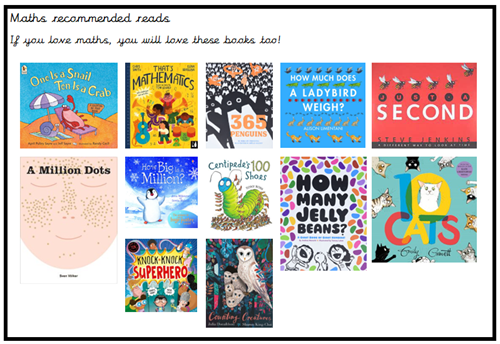Welcome
Welcome to our Mathematics page.
At Cleobury Mortimer Primary School, it is our aim to enable our pupils to ‘master maths’ through striving for effective teaching that is in line with current research about how all children can achieve well in maths. In order to accomplish this, we have adopted a ‘Teaching for Mastery’ approach for all year groups and classes, as defined by the NCETM.
NCETM - Mastery Explained:
Mastering maths means pupils acquiring a deep, long-term, secure and adaptable understanding of the subject.
The phrase ‘teaching for mastery’ describes the elements of classroom practice and school organisation that combine to give pupils the best chances of mastering maths.
Achieving mastery means acquiring a solid enough understanding of the maths that’s been taught to enable pupils to move on to more advanced material.
Five Big Ideas in Teaching for Mastery
At Cleobury Mortimer Primary School, we teach through the ‘Five Big Ideas’ of TfM which underpin our daily approach to teaching and learning. These have defined by the NCETM as:
In order to lay the foundations for this work, all teaching staff will attend/continue to attend Subject Knowledge Enhancement workgroups. Staff will spend time observing and reflecting on Teaching for Mastery lessons; taking part in external Maths Hub workgroups, as well as in school PD sessions, in order to deepen their understanding of the principles of this approach. In brief these principles have been defined by the NCETM as:
Coherence
Connecting new ideas to concepts that have already been understood, and ensuring that, once understood and mastered, new ideas are used again in next steps of learning, all steps being small steps
Representation and Structure
Representations used in lessons expose the mathematical structure being taught, the aim being that students can do the maths without recourse to the representation
Mathematical Thinking
If taught ideas are to be understood deeply, they must not merely be passively received but must be worked on by the student: thought about, reasoned with and discussed with others
Fluency
Quick and efficient recall of facts and procedures and the flexibility to move between different contexts and representations of mathematics
Variation
Varying the way a concept is initially presented to students, by giving examples that display a concept as well as those that don’t display it. Also, carefully varying practice questions so that mechanical repetition is avoided, and thinking is encouraged.
https://www.ncetm.org.uk/resources/50042)
Curriculum Intent:
At Cleobury Mortimer Primary School, our maths curriculum is based on the principles of Teaching for Mastery, as set out above, and is designed to be cohesive and carefully sequenced – we do not underestimate the importance of well thought out curriculum progression if all children are to achieve well:
‘(However) mathematics, more so than other content areas, builds—concepts and skills are connected, abstracted, and curtailed, and become the object of thinking at a new level of mathematical thought. . . .Only intentional activities focused on mathematics appear to make significant contributions to children’s learning. (Clements and Sarama 2018 p.3)
The importance of a carefully sequenced curriculum was also highlighted in OFSTED’s recent ‘Research Review Series’ of mathematics:
The evidence presented here supports careful consideration of sequencing and content that makes a mathematics curriculum a guarantee of long-term learning.
In addition to their regular maths lesson, children follow the NCETM ‘Mastering Number’ programme. This project aims to secure firm foundations in the development of good number sense for all children from Reception through to Year 6. The aim over time is that children will leave primary school with fluency in calculation and a confidence and flexibility with number. Attention is given to the key knowledge and understanding needed in Reception classes, and progression through KS1 to support success in the future. Pupils in KS2 take part in KS2 Mastering Number programme.
School staff follow a tailored curriculum based on the NCETM's Professional Development materials.
Curriculum Implementation:
Through developing Teaching for Mastery across Cleobury Mortimer School, we are also able to action recommendations from research. The EEF guidance report ‘Improving Mathematics in Key Stages 2 and 3’ makes 8 recommendations, the first 6 of these are clearly visible within a Teaching for Mastery approach:
- Use assessment to build on pupils’ existing knowledge and understanding
- Use manipulatives and representations
- Teach strategies for solving problems
- Enable pupils to develop a rich network of mathematical knowledge
- Develop pupils’ independence and motivation
- Use tasks and resources to challenge and support pupils’ mathematics
Clear links between the guidance in the EEF report and the NCETMs ‘5 Big Ideas of TfM’ have been made by Professor Jeremy Hodgen – Chair of Mathematics Education at the UCL Institute of Education – who led the evidence review for the EEF. The information can be found here:
https://educationendowmentfoundation.org.uk/news/eef-blog-mastery-and-maths/#closeSignup
At Cleobury Mortimer School, staff share the belief that with hard work and ‘the right kind of practice’ all children can learn maths. For this reason, we have adopted a whole class teaching approach:
‘a growing body of evidence that students’ mindsets play a key role in their math and science achievement. Students who believe that intelligence or math and science ability is simply a fixed trait (a fixed mindset) are at a significant disadvantage compared to students who believe that their abilities can be developed (a growth mindset)’. Carol Dweck 2008
The following TfM principles are fundamental to our practice:
- The belief that all pupils can achieve
- Keeping the class working on the same objective so that all can access and master mathematics (Keep up, not catch up)
- Development of deep mathematical understanding through a focus on mathematical structure and conceptual variation.
- The ability to reason about a concept and solve problems; some children will take this further and therefore be provided with the opportunity to ‘go deeper’ within the
- Development of both factual/procedural and conceptual fluency
- Longer time on key topics, providing time to go deeper and embed learning
Curriculum Impact
We hope that through following our cohesive and progressive curriculum, all children will make at least expected progress in maths and will become confident mathematicians who enjoy the subject. We measure children’s attainment in a number of ways to ensure they are making good progress. Where our assessments (or the information we gather) inform us that children are not making expected progress, we act to support children to keep up with their peers. The ‘Teaching a broad and balanced curriculum for education recovery’ document published by the DfE in June 2021 states that:
Progressing to teaching new content when pupils are not secure with earlier content limits their chances of making good progress later.
Therefore, teachers build in regular opportunities for formative assessment, particularly at the end of the teaching sequence, to ensure children are secure with the content that has been taught before moving on. Pupils in Y1,2,3 and 4 will complete an assessment task after the teaching of each block of learning. Regular assessment activities are planned into the Mastering Number programme which will allow teachers to identify gaps in understanding and move learning forward. This will be complimented in KS2 by a standardised test in the spring and the summer terms (NFER). This allows teachers to be confident that their assessments judgements are accurate, as well as allowing the measurement of progress over the year, key stage and primary phase.
When formative assessments show that pupils have not grasped a concept within a lesson, they will be offered further support, often in the form of a ‘keep up’ session with the TA or teacher. Wherever possible, this will take place before the next maths lesson.
At Cleobury Mortimer, we also believe that providing opportunities for regular recall of key knowledge is beneficial. The recent OFSTED ‘Research Review Series’ for mathematics stated that:
‘Frequent, low-stakes testing of taught content can help prepare pupils for summative tests by providing memory-enhancing opportunities to recall and apply taught content. Tests should therefore be aligned closely with curriculum sequences because generic tests are not able to give this feedback.
Staff use a range of resources for recall purposes, such as the White Rose ‘Flashback 4’ whilst children in Years 5 and 6 also use resources such as ‘Corbett Maths 5 A Day’. Opportunities for children to recall times tale facts are built into lessons.
As a staff, we are continually looking to further develop our practice through reflecting on what is working well and collaborating to overcome barriers or ‘difficult points’ that are identified. The statements set out in this document are what we are aspiring to achieve on a consistent daily basis to give our children the best possible chance to learn to love maths, achieve well and flourish.
(Updated November 2025)



